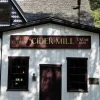More than one fifth of gambling premises in Great Britain are located in the most deprived 10% of areas of Britain, according to new research by the University of Bristol.
Carried out in collaboration with asset manager Aberdeen Standard Investments, the new report, ‘The Geography of Gambling Premises in Great Britain’, looked at the retail betting sector in Britain, with a focus on the relationship between gambling and deprived areas.
This covered betting shops, as well as casinos, bingo venues, family entertainment centres (FECs) and adult gaming centres (AGCs).
The report found that while there had been a 15.8% drop in the number of retail gambling locations between March 2018 and November 2020, land-based venues still accounted for 44% of Britain’s gross gambling yield (excluding lotteries) prior to the first novel coronavirus Covid-19 lockdown – around £5.0bn (€5.83bn/$6.82bn).
Researchers also discovered a concentration of gambling sites in more deprived areas, with 21% of gambling premises located in the most deprived areas of Britain, while just 2% were in the less deprived, more affluent regions of the country.
The report said the association between deprivation and number of gambling premises was strongest for bingo venues, followed by FECs and AGCs, though this relationship was still significant for betting shops and casinos. Some 29% of AGCs were located in the most deprived areas, with bingo venues on 30%, FECs 34%, casinos 24% and betting shops 18%.
While the City of London had the lowest population rate per betting shop, with one betting shop for every 304 people that live in the area, researchers mainly discounted this, saying people mainly travel into the area for leisure or work.
Glasgow City had a rate of 3,264 for its 194 betting shops, followed by Westminster with 3,308 for 79 shops, Liverpool on 3,662 for 136 shops and Brent with 3,790 for 87 shops.
In terms of FECs, the report highlighted a significant concentration in coastal towns, with 72% of all British FECs located in these regions. Ingoldmells and Chapel St Leonards had the highest number of FECs, with a total of 10 in November 2020.
It was also noted that the highest proportion of gambling treatment centres – 17% – were located in the most deprived areas of Britain, with researchers putting this down to the fact there were more gambling venues in these regions.
Other key findings included that over 9% of schools in England were located within 250m of the nearest gambling venue, meaning 742,000 pupils are a five-minute walk away from their closest gambling outlet.
Researchers also cited a 2018 YouGov study that found only 15% of consumers wanted a betting shop on their ‘ideal’ local high street, with 73% stating they would not want such a venue. In contrast, 92% of respondents would like a bank and post office, 91% a pharmacy and 90% a restaurant or café.
As to what local authorities are doing to tackle this, researchers said while there are some examples of evidence and policy being used to prevent clustering of gambling premises, it still remains difficult to challenge a licence application.
“The research highlights the clear mismatch between the amenities available in ‘left behind’ areas, compared with those that are more affluent,” University of Bristol senior research associate Jamie Evans said.
“Rather than having greater access to the facilities, services and opportunities that help people to improve their lives, those in more deprived communities are disproportionately faced with choices that can often prove harmful.
“While the gambling industry may offer some much-needed employment in these areas, it usually takes much more than it gives, leaving a legacy of greater hardship and increased social problems.”
The government’s Department for Digital, Culture, Media & Sport is currently in the process of reviewing the 2005 Gambling Act in order to bring rules and regulations up to date with the modern market.
Last year, a House of Lords select committee said that the new-look act should give licensing committees the same powers as they already have when deciding on the licensing of premises for the sale of alcohol. It added that local authorities should be able to decide where a betting shop is located based on what is good for the community as a whole.
Standard Life Foundation chief executive Mubin Haq added: “If we are to truly level up, the new gambling reforms currently being considered must take into account the geography of gambling venues and give local authorities more control over licensing.”
Original Article















